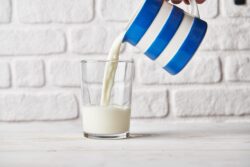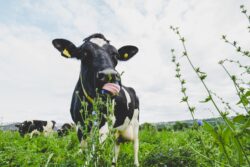Monday 8th January 2024
We’ve been producing organic milk and dairy products for over 30 years! We think it’s pretty special for lots of reasons. Our resident writer Lizzie Rivera from ethical lifestyle hub Live Frankly, is going to tell us more about the good stuff that goes into our white stuff.
Over to Lizzie…
Health and planet-conscious UK consumers continue to be concerned about the provenance of our food and drink. More and more of us are turning to organic milk and dairy products, because we associate organic products with healthiness, naturalness and authenticity.[1]

Organic milk is also great source of essential nutrients such as calcium, protein, vitamin B12, vitamin B2, phosphorous and potassium.
All those nutrients naturally present in milk contribute to the normal function of the body in everyday life. For example, calcium is necessary for your bones, protein is needed for building muscle and potassium helps maintain a normal blood pressure.[2]
Yeo Valley Organic’s network of 130 farmers all produce milk to organic standards. But, what does ‘organic’ really mean when it comes to dairy products?
Organic cows need to spend as much time as possible outside with access to pasture. When it gets too cold and wet, they come into the barns but still have plenty of space and individual mattresses to lie on.
Organic dairy farming has many more benefits, as fourth-generation dairy farmer John Pitts, from Woodhorn Farm, knows only too well. He transitioned his 1500-acre farm in West Sussex from being a conventional dairy to an organic dairy in the late 1990s. He was one of the first to supply Yeo Valley Organic through the Organic Milk Suppliers Co-operative (OMSCo) and has first-hand experience of both farming systems.
With a herd of 250 cows, I asked Pitts to break down the differences for us…
Why did you decide to transition to become an organic dairy farmer?
John says: “As a dairy farmer, we rear dairy cows and grow crops to feed them. As a conventional farmer I was allowed to use herbicides and chemical pesticides on the crops.
“There wasn’t an organic milk market as yet, but there were some pioneering farmers who were developing an organic dairy market and it seemed like a viable opportunity. So, I decided to make the switch.”

What’s the biggest difference between farming organically and conventionally?
John says: “Yes, organic farmers don’t use chemicals and pesticides and that’s what most people associate organic with.
“But, the bigger picture is we look at how we produce food in tune with nature, so we consider everything from the health of the animals to the health of the soil and even the biodiversity of the plants and insects on the farm.
“It’s a symbiotic system: cow manure feeds the soil, which leads to healthy crops, which feed the cows, which they then turn into manure… and so it goes round,” says John.
Let’s start with animal health. In 2017 farm animals accounted for around 30% of all antibiotics used in the UK, which is undermining their ability [3] What happens in organic farming?
John says: “Organic farmers aren’t allowed to use routine antibiotics.
“This is important because it means our whole dairy operation is based around how we look after the cows so they stay fit and well. The cows come first. From their diet, their housing, their milking – the system is designed to minimise stress and maximise health,” John explains.

Are there any other differences?
John says: “Organic standards are enshrined in law. So, buying organic milk is a great way for you to guarantee a cow has been out to pasture and grazing on grass for most of the year.
“Although, that said, our cows are particularly soft. In bad weather we find them waiting at the gate to be let back inside!
“There’s also strict housing requirements for organic cows. There has to be adequate space per cow. We know good ventilation is critical to their health. At Woodhorn Farm we also have loafing areas – yards where they can go out to get sun on their back and fresh air if they want, all year round.
“In conventional dairy systems, some cows can spend their entire lives inside. They can also be fed a lot of protein, so they produce more milk, which puts cows under a lot of pressure.”
It sounds like being an organic farmer is rewarding but can it be more challenging, too?
John says: “It is challenging, but through choice”
“We don’t have the safety net of being able to use chemical pesticides and chemicals when things don’t go quite right, so we have to manage our soils much better. It’s also more expensive, we need bigger buildings that house less cows, for example.
“But, the rewards are that we are working with nature. The ecosystem is alive! We’re surrounded by flora and fauna. The insect life is incredible and that attracts birds. We have just discovered a Barbastelle bat – one of the rarest in the UK – on our farm.
“I feel very comfortable and happy and proud about how we look after our animals. That’s very important to me.
“Of course, we don’t get everything right, no-one does. But, we’re doing our best to do the right thing.”
Interview and article by Lizzie Rivera and Francesca Carpani from ethical lifestyle hub Live Frankly.
Read more about the benefits of organic dairy here.
References:
[1] https://www.omsco.co.uk/wp-content/uploads/2019/01/The-Global-Organic-Dairy-Market-Report-2019-APP.pdf
[2] https://www.bda.uk.com/resource/dairy-benefits.html
[3] Percentage worked out based on the figures from the UK Government’s One Health report https://assets.publishing.service.gov.uk/government/uploads/system/uploads/ attachment_data/file/775075/One_Health_Report_2019_v45. pdf and the UK Veterinary Medicine’s Directorate https://assets.publishing.service.gov.uk/government/uploads/system/ uploads/attachment_data/file/842678/PCDOCS-_1705145-v1- UK-VARSS_2018_Report__2019__FINAL_v2.pdf – for further information contact marketing@soilassociation.org





I found it an interesting read. Although l was aware of many things organic, l thankfully learnt more.